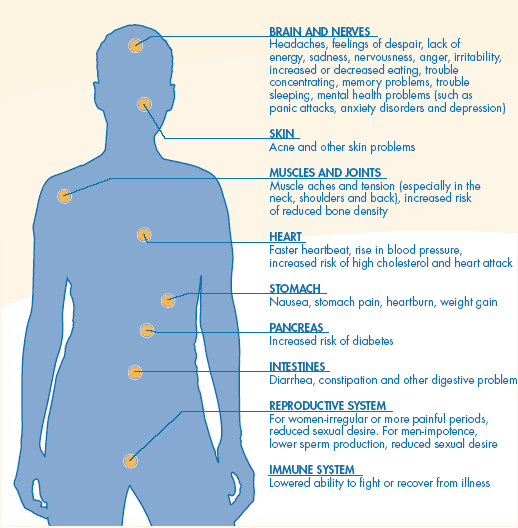
Physical and Mental Effects
You may feel physical stress, which is the result of too much to do, not enough sleep, a poor diet, or the effects of an illness. Stress can also be mental: when you worry about money, a loved one’s illness, retirement, or experience an emotionally devastating event, such as the death of a spouse or being fired from work.
However, much of our stress comes from less dramatic everyday responsibilities. Obligations and pressures which are both physical and mental are not always obvious to us. In response to these daily strains your body automatically increases blood pressure, heart rate, respiration, metabolism, and blood flow to your muscles. This response is intended to help your body react quickly and effectively to a high-pressure situation.
Stress often accompanies the feeling of “being out of control.”
Consider these tips and what will work best for you. It may be helpful to make a list of actions you can start to implement to help control your stress.
Tip For Work/Life Balance
For a lot of people, the pursuit of a healthy work/life balance seems like an impossible goal. With so many of us torn between juggling heavy workloads, managing relationships and family responsibilities, and squeezing in outside interests, it's no surprise that more than one in four Americans describe themselves as “super stressed.”
And that’s not balanced—or healthy.
Over time, stress weakens our immune systems, and makes us susceptible to a variety of ailments from colds to backaches to heart disease. New research shows that chronic stress can actually double our risk of having a heart attack. While we all need a certain amount of stress to spur us on and help us perform at our best, the key to managing stress lies in that one magic word: balance.
Achieving a healthy work/life balance is an attainable goal.
Tips to achieve balance when you're at work:
1. Set definitive work hours.
2. Set manageable goals each day.
3. Ask for flexibility.
4. Take a 5 minute break.
5. Listen to music.
6. Communicate honestly with colleagues.
When at home, follow these tips for balance:
1. Unplug from technology.
2. Divide responsibilities in your household.
3. Don't overschedule or overcommit - It's ok to say no .
4. Get support - whether it's through a meal delivery service or with a neighbor watching the kids to you can get a break - find ways to take tasks off your plate.
5. Treat your body well by staying active and eating nutritious foods.
6. Get help if you need it. If you are persistently overwhelmed, it may be time to seek help from a mental health professional. Asking for help is not a sign of weakness—taking care of yourself is a sign of strength.
*In partnership with Mental Health America


